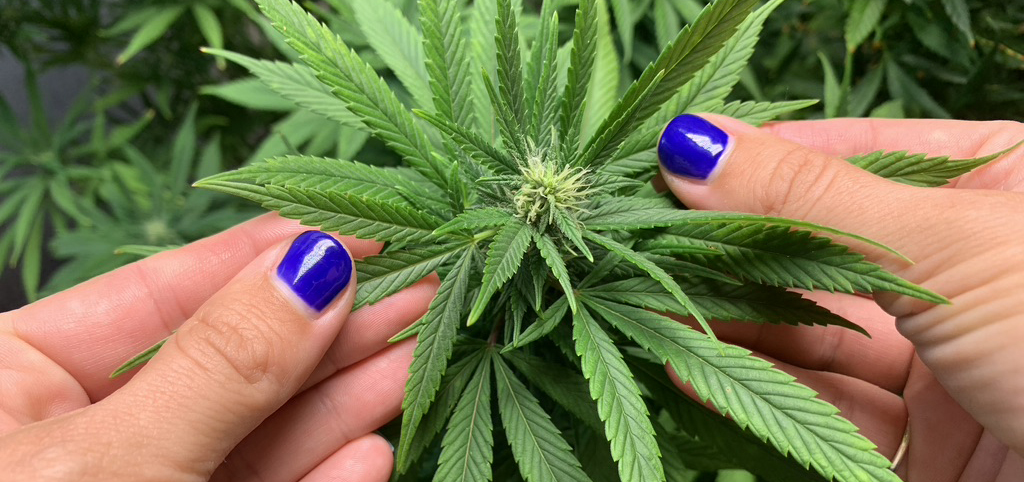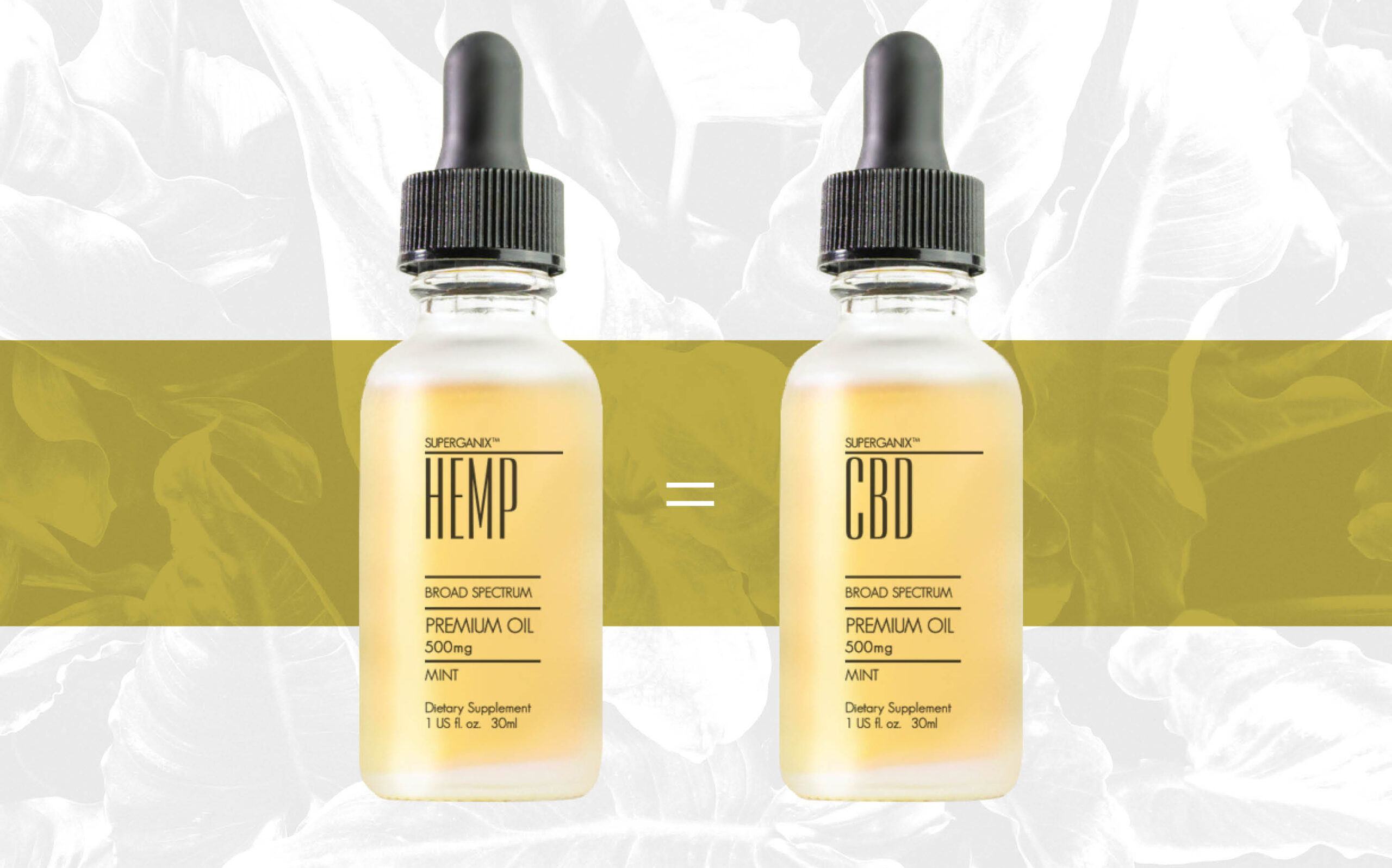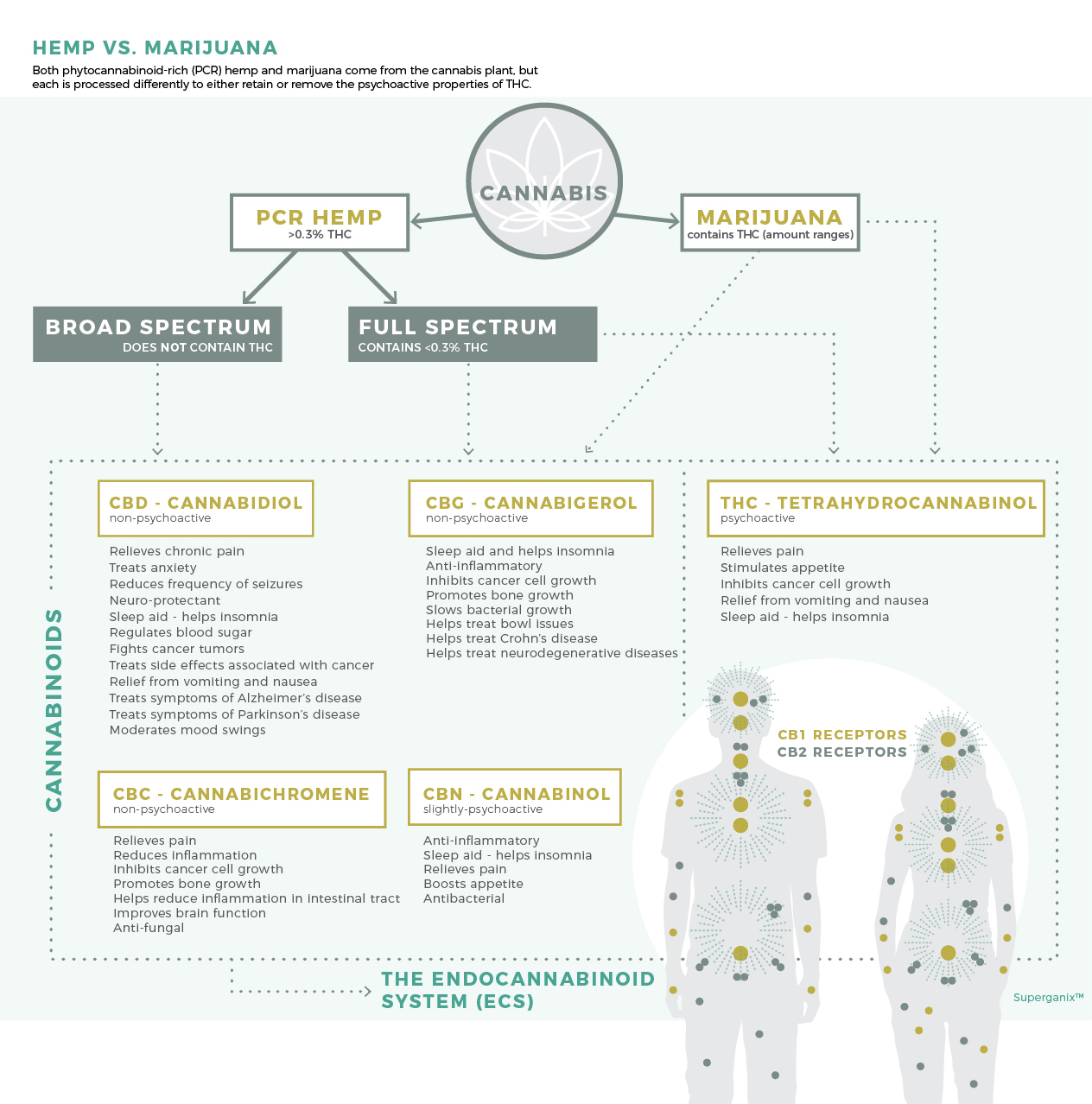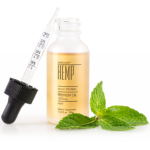What is PCR Hemp Oil?
Phytocannabinoid-Rich Hemp Oil
SHARE:
- August 28, 2020
- at 1:20 pm
- | by SUPERGANIX
The Cannabis plant genus is Mother Nature’s most robust source of an estimated 120+ phytocannabinoids, notably Δ9-tetrahydrocannabinol (THC) and cannabidiol (CBD).1 While it has been known for quite some time that marijuana (“weed”) has therapeutic properties, research over the past decade is uncovering the benefits of hemp extract, specifically phytocannabinoid-rich (PCR) hemp oil.
However, the lingo used in the hemp space is quite confusing, leading consumers into a headspin when trying to distinguish CBD oil vs PCR hemp oil. The good news is you came to the right place as this article will demystify these seemingly intertwined hemp-based products.

What is PCR Hemp Oil?
Phytocannabinoid-rich (PCR) hemp oil is specialized CBD oil that contains a full spectrum of phytocannabinoids found in hemp. In contrast to pure CBD isolate oil, PCR hemp oil gives you the complete ensemble of cannabinoids found naturally in hemp plants.
Why does this matter, you ask?
Recent scientific research suggests that consuming the entire spectrum of phytocannabinoids in hemp has greater beneficial effects compared to pure CBD.2
As an example, a study comparing the effects of five different Cannabis extracts with equal CBD concentrations and varying profiles of non-CBD cannabinoids on seizures in mice found that all of the extracts significantly reduced seizure frequency in mice.3
But there’s a kicker…
The magnitude of anti-seizure effects was greatest in the extracts that contained the full spectrum of phytocannabinoids, whereas pure CBD was comparatively less potent.
The salient takeaway from this is that the “minor” phytocannabinoids are more beneficial than previously thought. In fact, the “major” phytocannabinoids in hemp are only able to realize their full potential in the presence of the minor phytocannabinoids.
Researchers have called this the “entourage effect.”

PCR hemp oil vs CBD oil - What’s the difference?
Let’s provide some clarity to the semantics of PCR hemp oil vs CBD oil. It’s likely you’ve come across terminology like “full-spectrum CBD” or “broad-spectrum CBD,” but what’s the difference between them?
First, it’s important to recognize that hemp is not the same as marijuana. While they both come from the same plant (Cannabis), hemp is cultivated specifically to have a very low concentration of THC – less than 0.3% by law – and a higher concentration of nonpsychoactive CBD (as well as other phytocannabinoids).
As such, full-spectrum CBD oil is essentially the same as PCR hemp oil since they come from the same source plant; you can assume these terms are interchangeable.
When you buy full-spectrum CBD/PCR hemp oil, you’re not only getting all the beneficial phytocannabinoids in hemp, but also the array of more than 200 different antimicrobial and anti-inflammatory terpenes that give the plant its patent aroma.4 Hence, PCR hemp oil is as comprehensive as CBD gets.
Broad-spectrum CBD oil is similar to PCR hemp oil, but without THC. This comes at the cost of extra processing of the plant materials, which may also remove other phytocannabinoids. Thus, broad-spectrum hemp/CBD oil is not synonymous with PCR hemp oil.
Benefits of PCR hemp oil vs isolate-infused CBD oils
The endocannabinoid system (ECS) is an eponym that gets its name from the Cannabis plant genus. Research behind the ECS is budding as of late, with hundreds of studies being published in recent years. The findings continually demonstrate the promising benefits of PCR hemp oil as a modulator of the ECS.
Since the ECS is the quintessential “integrator” of all the body’s systems, it makes sense that the benefits of PCR hemp oil are thought to be quite extensive, such as:
- Alleviating symptoms of arthritis5
- Promoting healthy mood and stress response6
- Anti-seizure properties7
- Analgesia (pain relief)8
- Improving cognitive function9
In general, the multifunctional medicinal properties of PCR hemp oil are attributed to its capacity to restore “balance” (read: homeostasis) in the body.
However, many consumers presume that the benefits of pure CBD oil are superior to those of PCR hemp oil, which isn’t necessarily true. In fact, research contradicts that notion as the many phytocannabinoids in hemp extract work synergistically to bolster the ECS.10
This “entourage effect” of phytocannabinoids is not possible with pure isolate-infused CBD oil.

Does PCR hemp oil get you high?
The answer is “no!”
While the general population is slowly starting to accept PCR hemp oil as a practical and effective form of alternative medicine, there is still an unshakeable stigma attached to anything related to Cannabis.
So, why is that?
Well, it’s likely due to the recreational use of marijuana over the years, and subsequent restrictions imposed on it. Hence, marijuana tends to be a polarizing topic across the United States, with many people believing it’s dangerous because it gets you high. While that is true,
THC is ultimately the phytocannabinoid responsible for sensation of feeling “high” after using traditional marijuana.
PCR hemp oil, on the contrary, is non-intoxicating and contains a very low concentration of THC, meaning it won’t get you high. The unique composition of PCR hemp oil gives it an entirely separate safety profile from THC/marijuana products.
Furthermore, phytocannabinoids such as cannabidiol bind with cannabinoid receptors (e.g. CB1 and CB2) rather weakly, even at exceptionally large doses; THC – the main constituent of marijuana – strongly interacts with these receptors, especially CB1 receptors. Consequently,
marijuana has intoxicating psychoactive effects that alter consciousness.11
For example, a recent review of 25 animal studies on CBD did not find any notable adverse effects across a wide range of dosages and multiple routes of administration (e.g. oral, transdermal, and injection).12
PCR Hemp oil for pets
The ECS isn’t exclusive to humans; many organisms before us on the evolutionary tree of life have the ECS, even primitive animals that lived over half a billion years ago!13
So, what exactly does the ECS do?
In the broadest sense, the ECS is what helps the body maintain homeostasis by balancing the internal environment, particularly when faced with stress that throws off our equilibrium. You can see why this makes the ECS arguably the most essential body system for maintaining health and promoting longevity in not only humans, but also pets like dogs and cats.
By operating as an integral “maestro” that coordinates signaling between all body systems, the ECS regulates:
- Inflammation
- Immune response
- Cognition
- Digestion
- Blood pressure
- Injury and wound healing
- Neurotransmission
- Motor function
- Hormonal balance
A properly formulated PCR hemp oil for pets can help calm your dog or cat if they are overly active, and it may also serve as a naturopathic remedy for other pet health problems. As with any nutritional product, it’s prudent to consult with a veterinarian before using hemp oil for your pet.

Buying PCR hemp oil
Before you buy PCR hemp oil, it’s imperative to find a quality brand that offers tangible quality insights into their CBD products. The only way to determine how much CBD is in PCR hemp oil is through a certificate of analysis that characterizes the precise phytocannabinoid concentrations in the product. This is why Superganix PCR hemp products come with a scannable QR code on each bottle that provides a thorough COA.
Always do your research before buying PCR hemp oil. The more transparent a company is about their product(s) and where their hemp comes from, the more confident you can be their PCR hemp oil will support your healthy lifestyle.
SHARE:
- Andre, C. M., Hausman, J. F., & Guerriero, G. (2016). Cannabis sativa: the plant of the thousand and one molecules. Frontiers in plant science, 7, 19.
- Russo, E. B. (2018). The Case for the Entourage Effect and Conventional Breeding of Clinical Cannabis: No “Strain,” No Gain. Frontiers in plant science, 9, 1969.
- Berman P., Futoran K., Lewitus G. M., Mukha D., Benami M., Shlomi T., et al. (2018). A new ESI-LC/MS approach for comprehensive metabolic profiling of phytocannabinoids in Cannabis. Sci. Rep. 8:14280.
- Giese, M. W., Lewis, M. A., Giese, L., & Smith, K. M. (2015). Method for the analysis of cannabinoids and terpenes in Cannabis. Journal of AOAC International, 98(6), 1503-1522.
- Burstein, S. (2015). Cannabidiol (CBD) and its analogs: a review of their effects on inflammation. Bioorganic & medicinal chemistry, 23(7), 1377-1385.
- Bergamaschi, M. M., Queiroz, R. H. C., Chagas, M. H. N., De Oliveira, D. C. G., De Martinis, B. S., Kapczinski, F., … & Martín-Santos, R. (2011). Cannabidiol reduces the anxiety induced by simulated public speaking in treatmentnaive social phobia patients. Neuropsychopharmacology, 36(6), 1219-1226.
- Jones, N. A., Glyn, S. E., Akiyama, S., Hill, T. D., Hill, A. J., Weston, S. E., … & Williams, C. M. (2012). Cannabidiol exerts anti-convulsant effects in animal models of temporal lobe and partial seizures. Seizure, 21(5), 344-352.
- Russo, E. B. (2008). Cannabinoids in the management of difficult to treat pain. Therapeutics and clinical risk management, 4(1), 245.
- Maroon, J., & Bost, J. (2018). Review of the neurological benefits of phytocannabinoids. Surgical neurology international, 9.
- Marcu, J. P. (2016). An overview of major and minor phytocannabinoids. In Neuropathology of drug addictions and substance misuse (pp. 672-678). Academic Press.
- Pertwee, R. G. (2008). The diverse CB1 and CB2 receptor pharmacology of three plant cannabinoids: Δ9-tetrahydrocannabinol, cannabidiol and Δ9-tetrahydrocannabivarin. British journal of pharmacology, 153(2),
199-215. - Iffland, K., & Grotenhermen, F. (2017). An update on safety and side effects of cannabidiol: a review of clinical data and relevant animal studies. Cannabis and cannabinoid research, 2(1), 139-154.
- Di Marzo, V., Bifulco, M., & De Petrocellis, L. (2004). The endocannabinoid system and its therapeutic exploitation. Nature reviews Drug discovery, 3(9), 771.

